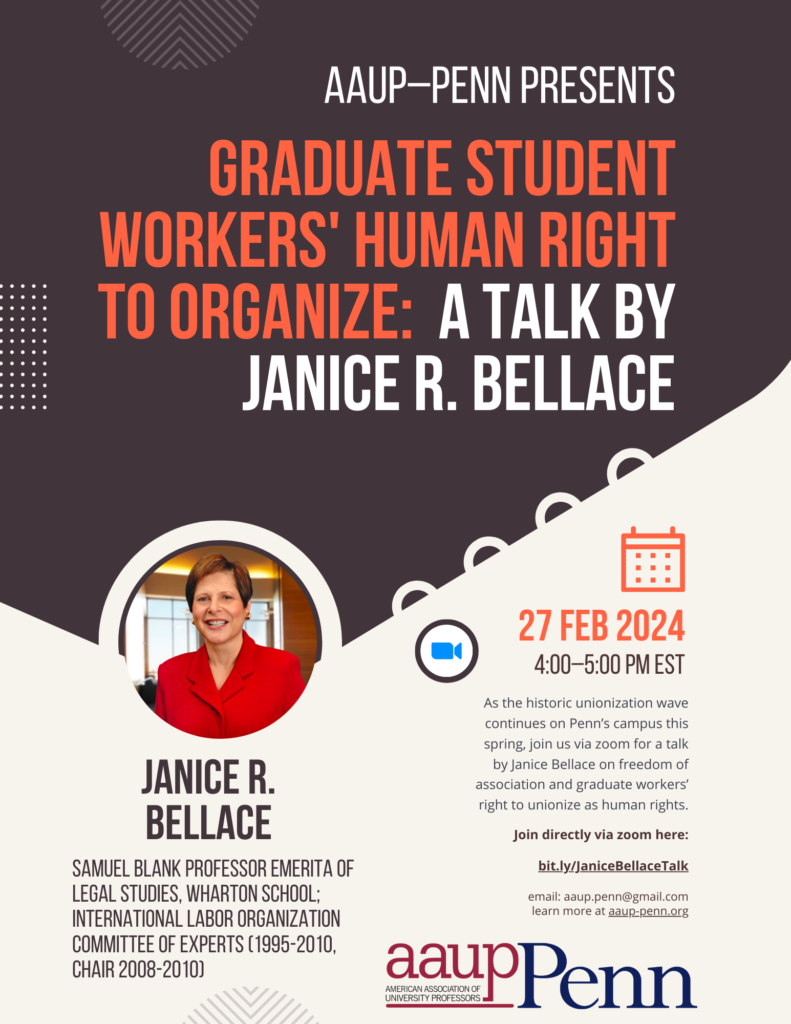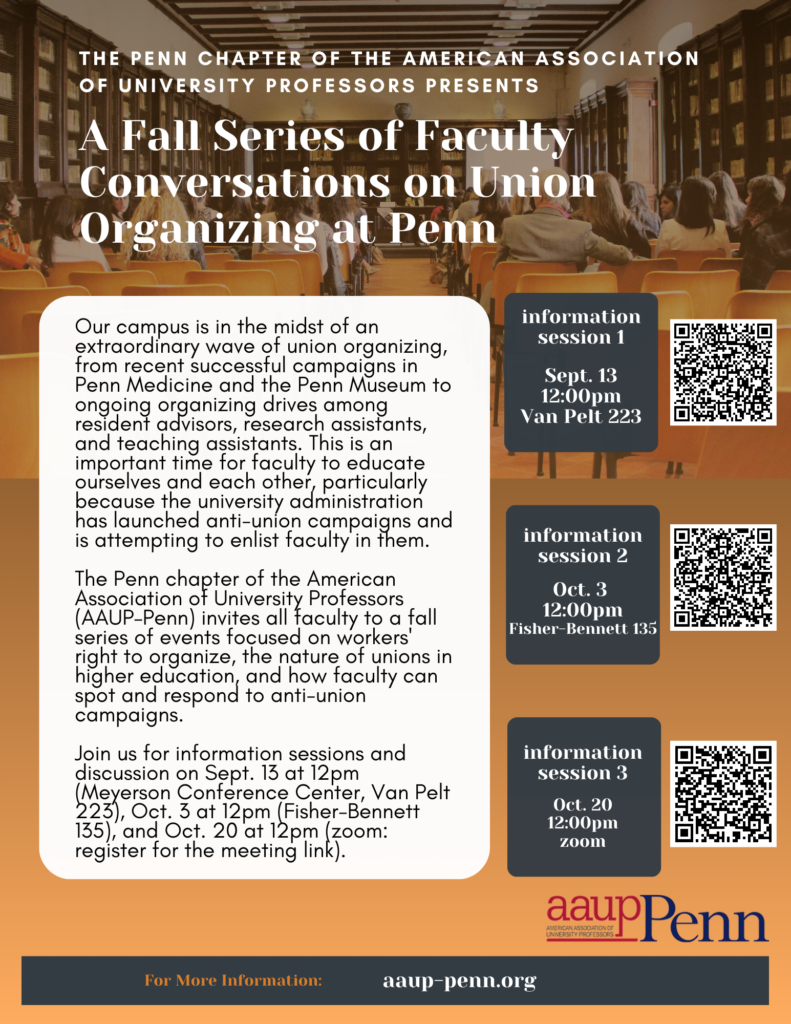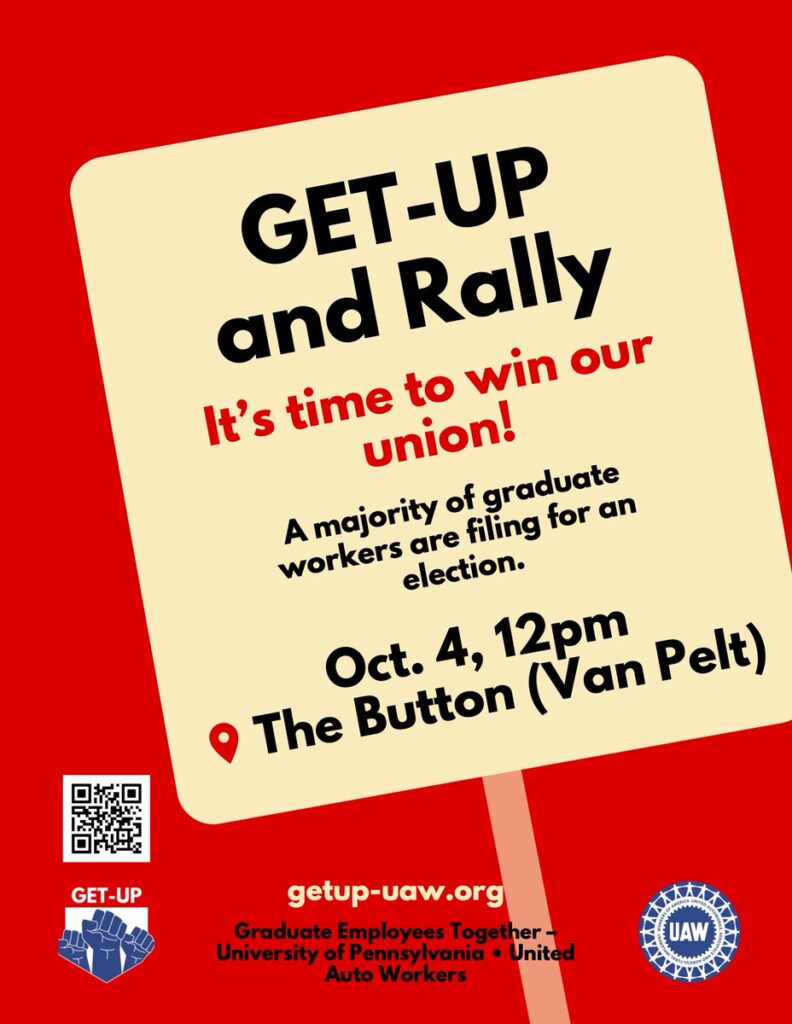July 7, 2025
Larry Jameson, President
John L. Jackson, Jr., Provost
Marta Bartholomew, Director of Postdoctoral Affairs
Dear President Jameson and Colleagues,
We write on behalf of the University of Pennsylvania chapter of the American Association of University Professors (AAUP-Penn) to ask that you implement a policy of neutrality in all union organizing drives at Penn. In particular, we ask you to end the anti-union campaign against Research Associates and Postdocs United at Penn (RAPUP), take down the anti-union website https://facts4pennpostdocs.org/, and respect the results of the upcoming union election on July 16 and 17.
The website presents talking points that have been part of anti-union campaigns in the United States since the 1970s, crafted by anti-union law firms and consultants. When workers launch organizing drives in the United States, over three-quarters of employers hire such firms to design anti-union campaigns for them.[1] Penn currently uses the law firm Cozen O’Connor in its campaign against postdocs and RAs.
Anti-union campaigns target workers with a standard set of messages, delivered through phone calls, text messages, emails, websites, mailers, posters, and meetings with supervisors:
- They depict unions as third parties that supposedly interfere with workers’ individual relationships with their employers. In fact, unions are organizations of workers themselves. Workers make up the bargaining committees that negotiate contracts, they vote on contracts, and they participate in grievance procedures as stewards. Workers organize unions precisely because individuals do not have effective negotiating power with large institutions. Collective bargaining is a way to make workers’ voices heard.
- They warn workers about union dues, implying that they might be worse off if they form a union. This is not a credible argument. Workers do not pay dues until they vote to ratify their first contract, and workers have no reason to ratify contracts that leave them worse off. Furthermore, according to the US Department of Labor, unionized workers in the United States earn 18% more than non-union workers do;[2] union dues are generally less than 2% of wages.
- They issue threats, often couched as expressions of concern. For instance, employers warn workers that even if they vote to form a union, it might take them years to negotiate a first contract, and the terms of that contract might fall short of their expectations—they might even be worse than their current terms of employment. These are threats indicating the employer intends to fight workers in contract negotiations.
- They warn that unions will impose rigid rules inappropriate to their workplace. This argument presents a distorted picture of union contracts, which take many forms. Unionized workers, including those in US universities, have long negotiated contracts protecting some forms of flexibility while establishing guarantees that workers need. This argument also obscures the fact that workers in non-union settings are already subject to rules; having a union simply allows them a voice in determining and enforcing those rules. Finally, this argument loses its luster when one realizes that all employers make it: big-box stores, manufacturers, and institutions of higher education all claim that they are uniquely flexible workplaces where unions could not operate.
- They present positive workplace policies as evidence that workers don’t need unions. This obscures the fact that current policies are often products of past mobilizations. For instance, in recent decades, union organizing drives by postdocs and research associates have led universities nationwide to improve pay and benefit packages. Penn’s website now presents those improvements as evidence that organizing is needless or destructive.
- They advise workers who signed cards to change their minds and vote no in the election. They tell workers to give management one more chance.
All of these talking points appear on the website above. We understand that the university administration is deploying other standard anti-union tactics as well. Lawyers from Cozen O’Connor representing Penn challenged the right of postdocs and research associates to organize before the NLRB, based on the false argument that they are only “temporary” employees.[3] The NLRB rightly rejected this argument. In addition, Penn has illegally deployed the Temporary Standards and Procedures for Campus Events and Demonstrations—now in effect for over a year—to repress union gatherings on campus in violation of federal labor law. Under the 1935 National Labor Relations Act, workers have the right to engage in concerted activity—that is, collective action to address shared workplace concerns—and on college campuses, concerted activity routinely takes the form of rallying on campus.[4] Yet on June 12, when RAPUP members gathered for a peaceful demonstration at the Button, they were forced off campus. The Penn administration knows that such measures are illegal: in August 2024, Penn security prevented medical residents in CIR/SEIU from gathering in the courtyard of Pennsylvania Hospital for a union event. This violation of federal labor law resulted in an Unfair Labor Practice charge against Penn.[5]
These messages and tactics have no place in our community. Their fundamental purpose is to interfere with workers’ right to organize, guaranteed in the 1935 National Labor Relations Act. That law established that the decision to form a union—or not to do so—belongs to workers themselves. It is theirs alone to make; employers do not get a vote in certification elections, and their views are simply irrelevant. Penn’s anti-union campaigns convey an unwillingness to accept those facts. They aim to sow doubt, fear, and confusion among workers to sway the outcome of elections. Their legal maneuvers seek to strip workers of their right to organize and prevent an election from happening at all.
We further object to recent attempts to enlist faculty members in anti-union activity. The anti-union website has been shared with faculty in a clear attempt to instrumentalize our relationships of mutual respect and trust with postdocs and research associates. In setting us up to deliver intimidating and misleading messages, they threaten to corrode those very relationships and compromise our integrity.
Finally, we object to these anti-union tactics because they are inconsistent with the research and teaching mission of the university. Paying law firms and consultants to fight our own postdocs and research associates is not a productive use of Penn’s resources in any situation, and it is particularly egregious given that Penn has cited federal funding cuts as the reason for hiring freezes, cuts to graduate training, contract nonrenewals for non-tenure-track faculty, and other austerity measures that compromise the university’s core mission. As over 1,100 of us demanded this spring, the administration must use its resources to uphold research and teaching, and to uphold the rights of all members of the Penn community; it should not use those resources to disenfranchise our own colleagues. Nor is Penn’s anti-union campaign a rational defense of institutional interests. The improved working conditions that unionization might yield would not harm the university; rather, they would make Penn a better place for all of us to teach, learn, and conduct research.
The proper posture of an employer during an organizing drive is neutrality: management should simply step back and allow workers to make their decision. Neutrality not only respects the original spirit of the National Labor Relations Act, but it lays the groundwork for a productive, mutually beneficial relationship with a union should workers vote to form one.
For all these reasons, we ask that you take down the https://facts4pennpostdocs.org/ website, end the anti-union campaign under way, and refrain from such activity in the future. We also ask that you respect the results of the upcoming RAPUP union election. We look forward to your response.
Sincerely,
Executive Committee, AAUP-Penn
[1] John Logan, “The Union Avoidance Industry in the United States,” British Journal of Industrial Relations vol. 44, no. 4 (Dec. 2006): 651-675; Lane Windham, Knocking on Labor’s Door: Union Organizing in the 1970s and the Roots of a New Economic Divide (Chapel Hill: University of North Carolina Press, 2017).
[2] US Department of Labor, Bureau of Labor Statistics, News Release USDL-23-071, January 19, 2023.
[3] NLRB Case 04-RC-364372, https://www.nlrb.gov/case/04-RC-364372
[4] https://www.nlrb.gov/about-nlrb/rights-we-protect/the-law/employees/concerted-activity
[5] “Penn Med residents seek unfair labor practice charge after attempt to deliver petition,” Daily Pennsylvanian, September 2, 2024, https://www.thedp.com/article/2024/09/penn-medicine-union-rally-petition-mahoney-krajewski




